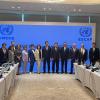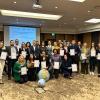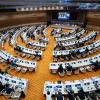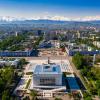News
Displaying Results 51 - 75 of 1278
Increasing the use of digital solutions including those developed by the United Nations Centre for Trade Facilitation and Electronic Business (UN/CEFACT) can enhance the sustainability and resilience of supply chains and strengthen global connectivity.
In a series of capacity-building activities…
The explosion in data availability is changing the world. UNECE and the international statistical community are working to ensure that data is used for the good of the public. Released today, the UNECE publication Data Stewardship and the Role of National Statistical Offices in the New Data…
Mapping air pollutant emission sources of a given country can help experts and decision-makers understand which policies are most viable. Spatial allocations of emissions are also important to understand where emissions are coming from on a regional level.
Spatially allocating – or gridding –…
Much of Chad's water resources are shared, notably the Lake Chad basin and its many tributaries and distributaries (shared with Cameroon, Central African Republic, Libya, Niger, Nigeria, Sudan and Algeria), the Niger River basin (shared with Benin, Burkina Faso, Cameroon, Côte d'Ivoire, Guinea,…
Guaranteeing safe access to drinking water and sanitation remains a challenge in the pan-European region, with 16 million people still lacking access to basic drinking water services and over 29 million people not having access to basic sanitation, including hundreds of thousands who have to…
Infrastructure projects are crucial for sustainable development, impacting not just economies but also communities and the environment. The tangible benefits they bring to people's lives can have a transformative effect and contribute to achieving the Sustainable Development Goals (SDGs). However,…
Around 3.6 billion people live in contexts that are highly vulnerable to climate change and many of them are in transboundary basins. Droughts do not recognize borders, pose transboundary risks, and require cooperation to address them. The 6th IPCC assessment (2022) and the IPCC synthesis (2023)…
The global market for second-hand clothing has been multiplied by seven in the last 4 decades. The practice of exporting second-hand clothing from developed to developing countries has been intensified by the boost of the fast fashion industry, impacting the environment, social and human rights in…
With less than 7 years remaining to achieve the 2030 Agenda for Sustainable Development and its Sustainable Development Goals (SDGs), the implementation of these ambitious goals is in peril. Progress is insufficient in many key areas and further affected by multiple crises, as pointed out in UNECE’…
The COVID-19 pandemic and the regional conflicts have negatively affected economic development in Eastern Europe and the South Caucasus (EESC), significantly disrupting international trade, investment and cooperation. To achieve a resilient recovery and support the transition to knowledge-based and…
Four years ago, when the COVID-19 pandemic hit, it disrupted the normal functioning of open markets. The ensuing crisis had crippling effects on global trade and productive capacities: it broke supply chains, reduced connectivity and slowed the flow of essential goods. Global food and energy…
The raw materials sector is at the forefront of global challenges and opportunities of the 21st century, as it plays a vital role in the energy, transport, and digital transitions required to mitigate and adapt to climate change. However, the sector also faces significant pressures from consumers,…
The impact of different air pollutants on vegetation and crops has been studied for over 35 years in the framework of the UNECE Convention on Long-range Transboundary Air Pollution, through its International Cooperative Programme on Effects of Air Pollution on Natural Vegetation and Crops (ICP…
In recent years, Montenegro and its capital city, Podgorica, have been committed to accelerate sustainable and smart urban development through a variety of ambitious national and regional and local measures, such as digitalization of public services, modernization of public transport, and to…
The Sustainable Development Goals (SDGs) require a massive transformation of our economies and societies, and a shift towards more sustainable patterns of production and consumption. Public-Private Partnerships (PPPs) are a powerful tool to support this transformation, as they can mobilise private…
Would you trust artificial intelligence (AI) in your heart? This is not some imaginary, science-fiction scenario. Biomedical companies are already developing pacemakers embedded with AI. Digital technologies like AI are also opening new possibilities such as improved management of natural resources…
The transport sector is responsible for 23% of global greenhouse gas emissions, with road transport accounting for around 77% of these emissions. As populations, economies, and the need for mobility grow, the World Bank estimates that greenhouse gas (GHG) emissions from transport could increase by…
Ensuring the principles of environmental democracy are upheld in relation to modified organisms/genetically modified organisms (LMOs/GMOs) can help countries to address biodiversity loss and support progress on a number of Sustainable Development Goals, in particular Goals 2 (zero hunger), 15 (life…
Sierra Leone shares four major rivers with the neighbouring countries of Guinea and Liberia, including the Great Scarcies, Little Scarcies and Moa shared with Guinea, and Mano River shared with Liberia. All provide crucial freshwater that sustains ecosystems, livelihoods and the well-being of…
UNECE has today released a detailed inventory of Thematic and Extended Accounts.
This new resource offers comprehensive insights into the economic accounts published by countries worldwide that expand on the classical measures included in core national accounts.
The System of National…
At the World Economic Forum Annual Meeting in Davos, UNECE Executive Secretary Tatiana Molcean highlighted the role of UNECE’s legal instruments, standards and tools in dealing with the most pressing global challenges, namely climate change, digital and green transformations, low-carbon energy…
Burkina Faso is one of the Sahelian countries hardest hit by the effects of climate change, experiencing torrential rains and floods, as well as periods of insufficient rainfall.
To help address these challenges, through adaptation, resilience and concerted, shared management of its water…
In recent years, the participating States of the United Nations Special Programme for the Economies of Central Asia (SPECA) - Afghanistan, Azerbaijan, Kazakhstan, Kyrgyzstan, Tajikistan, Turkmenistan, and Uzbekistan - have observed rapid growth in the number and impact of business incubators and…
The Government of Ukraine is committed to rebuilding its infrastructure with a focus on achieving the Sustainable Development Goals (SDGs) and pursuing a resilient, inclusive and sustainable recovery.
However, the reconstruction and recovery needs of Ukraine are enormous and were estimated by…
Originally introduced in policy and development discussions in 2011, the water-food-energy-ecosystem nexus approach has evolved into a pivotal framework for sustainable development and achieving the Sustainable Development Goals (SDGs).
Work on the water-energy-food-ecosystems nexus under the…


























